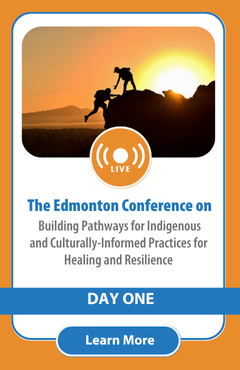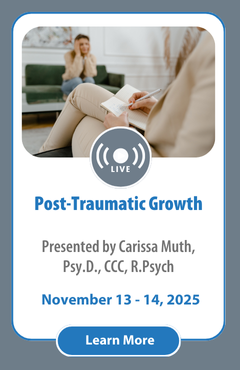Description

LIVE STREAM: November 12 – 14, 2025 from 8:30am – 4:00pm (Edmonton, AB) Please adjust your start time according to your specific time zone.
ON-DEMAND: Recorded footage & course content (certificate, videos, quiz) will be available until December 15, 2025. Please allow 3 – 10 business days for footage to be processed. Extensions cannot be granted under any circumstances.
November 12, 2025 | Day One
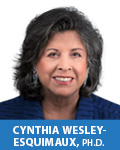
Empowering Ourselves to Strengthen Our Future
This one-day workshop, facilitated by Cynthia Wesley-Esquimaux, will focus on the integration of traditional Indigenous healing and spiritual practices within mental health and educational frameworks. Designed for professionals working with children, adolescents, young adults, families, and communities, it will offer practical tools and culturally grounded insights that can be applied in clinical, educational, or community settings.
Participants will explore strategies for supporting cultural revitalization and community healing, with a particular emphasis on fostering sustainable, Indigenized practices. The workshop will provide opportunities for deep engagement with Indigenous healing traditions, encouraging reflection on both personal and community experiences. Through collaborative discussions and activities, attendees will develop actionable strategies for revitalizing and integrating traditional spiritual practices into contemporary mental health and educational approaches.
Whether you work with individuals, families, or larger community groups, this session will equip you with practical knowledge to enrich your work and support the healing and resilience of Indigenous communities.
November 13, 2025 | Day Two
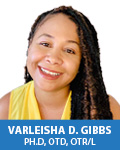
Healing Through Spirit: Integrating Indigenous Healing Practices in Education and Mental Health
This workshop offers educators a transformative opportunity to explore the intersection of trauma and spirituality within Indigenous communities, focusing on the impact of intergenerational trauma and how cultural wisdom can support resilience and well-being. By examining both traditional and contemporary healing practices, participants will deepen their understanding of how Indigenous spirituality, storytelling, and community-centered approaches can foster healing, restore balance, and strengthen the individual and collective health of students and families.
Indigenous communities have long faced the repercussions of colonization, forced assimilation, and systemic violence. These traumas have been passed down through generations, affecting the mental, emotional, and social well-being of individuals, families, and communities. Yet, alongside these challenges, Indigenous cultures possess profound spiritual traditions and healing practices that have endured. These practices remain a vital source of identity, resilience, and recovery, offering pathways to healing for those impacted by trauma.
This workshop is designed to empower educators and other professionals working in or with Indigenous communities. Participants will learn culturally grounded approaches to support healing in educational settings, incorporating Indigenous spiritual traditions, cultural practices, and storytelling to enhance student well-being and academic success. The workshop will also provide practical tools for integrating these healing methods into classroom teaching, school activities, and community-based programs.
Through engaging hands-on activities and thoughtful discussion, participants will gain the knowledge and skills to create healing environments that acknowledge and address the wounds of the past while fostering hope, empowerment, and community revitalization.
November 14, 2025 | Day Three
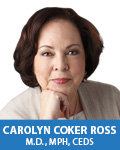
Generations of Healing: Culturally-Informed Responses to Address Intergenerational Trauma for Educators, Mental Health Professionals and Community
Intergenerational trauma doesn’t impact just one person—it weaves through families, classrooms, and entire communities. Educators, counselors, and mental health professionals alike witness its ripple effects: students who struggle to regulate emotions, families locked in cycles of adversity, and communities burdened by the legacies of historical and cultural trauma.
Extensive research has shown a direct link between early life trauma and long-term mental health outcomes, including substance use disorders (SUD) and eating disorders while traits such as compulsivity, impulsivity and emotional dysregulation are promoted. More than two-thirds of individuals with SUD report childhood experiences of abuse, neglect, or toxic stress. Emerging evidence now confirms that trauma’s effects can be passed biologically and behaviorally from one generation to the next, contributing to cycles of substance use, mental illness, eating disorders and family disruption.
While trauma-informed care has helped many individuals begin their healing journey, few programs offer tools to address the collective and generational dimensions of trauma—especially within Indigenous and historically marginalized communities.
In this informative and thought-provoking workshop, Dr. Carolyn Coker-Ross will explore the neurological, relational, and cultural impacts of trauma across generations. Drawing on case studies and culturally grounded approaches, she will equip educators, therapists, and community leaders with strategies to break the cycle of trauma, foster resilience, and support whole-family healing.
Education and Clinical Professionals: K–12 Classroom Teachers, School Counsellors/Psychologists, Learning Assistance/ Resource Teachers, School Administrators, School Paraprofessionals including Special Education Assistants, Classroom Assistants and Childcare Workers. All other professionals who support students including but not limited to: Nurses, Social Workers, Psychologists, Clinical Counsellors, Family Therapists, Occupational Therapists, Speech Language Pathologists, Addiction Counsellors, Youth Workers, Mental Health Workers, Probation Officers, Police Officers, and Early Childhood Educators.
Parents, Caregiver, Foster Parents, Grandparents, and Extended Family raising a child.
Cynthia Wesley-Esquimaux, Ph.D. served as Vice Provost for Indigenous Initiatives at Lakehead University for three years. Effective September 2016 she was appointed as the 1st Indigenous Chair for Truth and Reconciliation in Canada for Lakehead University and continues to develop pathways forward to reconciliation across Canada. Cynthia was inducted as a “Honourary Witness” by the Truth and Reconciliation Commission of Canada in 2014, and is the Chair of the Governing Circle for the National Centre for Truth and Reconciliation at the University of Manitoba.
Cynthia was the inaugural Nexen Chair for Indigenous Leadership at the Banff Centre for Arts and Creativity where she remains a faculty member and is currently the Interim Director for the Indigenous Leadership Program. She is also Chair of the Teach for Canada non-profit which recruits teachers for remote First Nation schools in Ontario and Manitoba.
Cynthia is a member and resident of the Chippewa of Georgina Island First Nation in Ontario and has dedicated her life to building bridges of understanding. She sees endless merit in bringing people from diverse cultures, ages, and backgrounds together to engage in practical dialogue and applied research initiatives. She is deeply committed to public education and offers as many as 150 key notes, workshops, and training sessions annually to a variety of groups, organizations and institutions. She teaches on historic and contemporary Indigenous trauma and wisdom, treaties and right relations, active youth engagement, and Indigenizing education.
She is always interested in mentoring young people and co-founded a youth project out of the University of Toronto, the University of Saskatchewan and Lakehead University. More information on the Canadian Roots Exchange (CRE) can be found at: www.canadianroots.ca.
Varleisha D. Lyons Ph.D, OTD, OTR/L is a renowned occupational therapist, author, and speaker who is deeply passionate about promoting culturally intelligent and spiritually centered mental health care. As a woman of African American and Native American heritage, with ancestral ties to the Haliwa-Saponi tribe through her grandmother, Dr. Lyons is dedicated to integrating Indigenous spiritual practices into modern therapeutic frameworks.
Her work is rooted in a commitment to honoring diverse traditions and creating holistic approaches that address the mind, body, and spirit. She draws inspiration from practices such as storytelling, nature-based rituals, and ancestral healing, advocating for their inclusion in contemporary mental health systems.
Dr. Lyons is a tireless advocate for mental health parity and equity, particularly for underserved communities of Indigenous and African descent. Her mission is to bridge traditional healing practices with modern therapeutic methods, fostering understanding and respect for cultural identity and spiritual connection.
As a highly sought-after speaker and author, Dr. Lyons empowers audiences worldwide to embrace diversity, advocate for systemic change, and celebrate the intersection of heritage and healing in occupational therapy and beyond.
More information: http://DrVarleisha.com
Carolyn Coker Ross, MD, MPH, CEDS is an African American author, speaker, expert the treatment of eating disorders, trauma and addictions. Dr. Ross is a graduate of The University of Michigan Medical School. She completed a residency in Preventive Medicine and a Master’s in Public Health (MPH) at Loma Linda University and a fellowship in Integrative Medicine at the University of Arizona. She is board certified in Preventive Medicine and in Addiction Medicine. Dr. Ross also completed certification by Cornell University in Diversity, Equity and Inclusion. Dr. Ross has been an international speaker and consultant on issues of mental health, trauma and workplace productivity. She received an award for Outstanding Service in Addiction Medicine in 2022 from Friendly House Los Angeles and the Dr. Peter Hayden Diversity, Inclusivity and Racial Equity Award from the National Association of Addiction Treatment Providers (NAATP) in 2023. Dr. Ross presented a TEDx Pleasant Grove talk on “Historical and Intergenerational Trauma in January 2020. She is a co-founder of the Institute for Antiracism and Equity (antiracismandequity.com), a consulting group that offers trainings to organizations on diversity and equity in the workplace.
| Registration | Early bird Fee | Regular Fee |
|---|
| Individual 1 Day Enrollment | $244.00 | N/A |
| 1 Day Group 3 - 7 | $183.00 | N/A |
| 1 Day Group 8 - 15 | $122.00 | N/A |
| 1 Day Group 15+ | $97.60 | N/A |
| Individual 2 Day Enrollment | $484.00 | N/A |
| 2 Day Group 3 - 7 | $363.00 | N/A |
| 2 Day Group 8 - 15 | $242.00 | N/A |
| 2 Day Group 15+ | $193.60 | N/A |
| Individual 3 Day Enrollment | $664.00 | N/A |
| 3 Day Group 3 - 7 | $498.00 | N/A |
| 3 Day Group 8 - 15 | $332.00 | N/A |
| 3 Day Group 15+ | $265.60 | N/A |
All fees are in Canadian dollars ($CAD) and per person.
How to Purchase a Group Rate
-
Add Seats to Your Cart
Select the total number of seats you need for your group and add them to your cart. Each seat represents one participant who will be enrolled in the course.
-
Complete Your Purchase
Proceed to checkout and complete the payment for the total number of seats needed for your group.
-
Contact Our Office
Once your purchase is complete, please contact our office at webinars@jackhirose.com with your order number.
-
Receive Group Enrollment Link
We will send you a unique link that you can distribute to group members. Group members will be required to use this link to complete receiving access to the course.
If you have any questions or need assistance, don’t hesitate to reach out.
Fees are per person, seat sharing is not allowed. Please respect this policy, failure to comply will result in termination of access without a refund. For group rates please contact webinars@jackhirose.com






